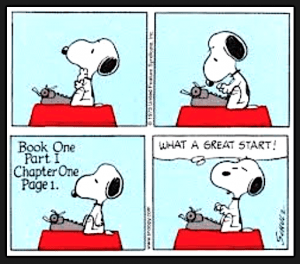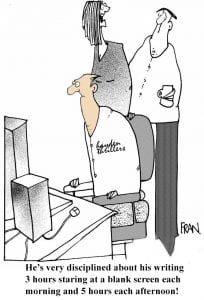Kristan Hoffman writes: “Some days the font is all wrong. Some days your wrists hurt. Or your back hurts. Or both. Some days your dog won’t stop barking, and there are three loads of laundry to fold. Some days you can’t fall asleep because you’ve got a million ideas for your story. Some days you can’t remember a single one.
 Some days the words just flow. Hundreds, maybe thousands of them in a rush. Some days you feel so high. Some days you laugh at your own funny parts, and cry at the sad ones. Some days you know that this book is The One.
Some days the words just flow. Hundreds, maybe thousands of them in a rush. Some days you feel so high. Some days you laugh at your own funny parts, and cry at the sad ones. Some days you know that this book is The One.
Then some days you read about that 7-figure, 3-book deal and you just want to scream. Some days you think it’s never going to be you. Some days you wonder why you even bother.
And some days you read a great book, and you think, This is why. I can do this. I will do this. I am doing this.”
I love this advice and it reiterates what many great writers have said. For example, George Orwell notes that, “Writing a book is a long, exhausting struggle, like a long bout of some painful illness.” Even the Everest of a writer, F. Scott Fitzgerald, admitted, “All good writing is swimming under water and holding your breath.”
As I struggle to re-write portions of my next thriller, it is helpful to have these thoughts to ponder and ease the burden. Sometimes, putting the computer down and losing myself in my plot or character gives me the space to find new ideas and better ways to write about them. I wonder if giving my thoughts more space allows new ones the room to come in?

 Bob French says, “James Bond’s famous tag line is actually a reversal of the original quote from Fleming’s books. The author used the line “stirred not shaken” to add yet another facet to Bond’s cool image. If a Martini is shaken, the alcohol becomes “bruised”, which detracts from the desired flavour – something which agent 007 would of course immediately notice and be suitably repulsed by. It was decided that the line “shaken not stirred” sounded much better, however, and so was adopted for the film – thus creating a character with a good collection of sound bytes, but a slightly odd taste in drinks.”
Bob French says, “James Bond’s famous tag line is actually a reversal of the original quote from Fleming’s books. The author used the line “stirred not shaken” to add yet another facet to Bond’s cool image. If a Martini is shaken, the alcohol becomes “bruised”, which detracts from the desired flavour – something which agent 007 would of course immediately notice and be suitably repulsed by. It was decided that the line “shaken not stirred” sounded much better, however, and so was adopted for the film – thus creating a character with a good collection of sound bytes, but a slightly odd taste in drinks.” Author Dr. Saumya Dave
Author Dr. Saumya Dave “Your best work is more like being a secretary than being a creative person—you just take the stuff down.” Stephen King in an interview by BDN Maine. Stephen mentions that he never knows how his novels are going to finish. He waits until he gets there before choosing the end—much like choosing dessert after you have finished the main course. John Grisham disagrees and must have the last chapter figured out before he starts a new novel. Me? I have done both and can see merits in either approach. I love the freedom of seeing where the writing will take me, but also appreciate the discipline of plotting a novel before beginning. My first novel, 3 WISE MEN, was like following a string through the darkness. Even I was surprised how it ended and readers loved the spontaneous events that shocked them on the way through. In my second novel, I knew how and where it would end, but still had to fill in the details. The conclusion to Ideas and Writing? Both approaches work fine. It is up to the author. However, have you ever noticed some authors using a formula for their plot development? It gets boring! I’m one who likes to mess it up and surprise readers, as well as myself! I remember the strange experience of sitting down during a break in my teaching and the words poured out, and included an event that even shocked me. It might have been subconscious, but it was real and many commented that they “never saw it coming.” If your writing never sees an event coming, then your shock is magnified for readers!
“Your best work is more like being a secretary than being a creative person—you just take the stuff down.” Stephen King in an interview by BDN Maine. Stephen mentions that he never knows how his novels are going to finish. He waits until he gets there before choosing the end—much like choosing dessert after you have finished the main course. John Grisham disagrees and must have the last chapter figured out before he starts a new novel. Me? I have done both and can see merits in either approach. I love the freedom of seeing where the writing will take me, but also appreciate the discipline of plotting a novel before beginning. My first novel, 3 WISE MEN, was like following a string through the darkness. Even I was surprised how it ended and readers loved the spontaneous events that shocked them on the way through. In my second novel, I knew how and where it would end, but still had to fill in the details. The conclusion to Ideas and Writing? Both approaches work fine. It is up to the author. However, have you ever noticed some authors using a formula for their plot development? It gets boring! I’m one who likes to mess it up and surprise readers, as well as myself! I remember the strange experience of sitting down during a break in my teaching and the words poured out, and included an event that even shocked me. It might have been subconscious, but it was real and many commented that they “never saw it coming.” If your writing never sees an event coming, then your shock is magnified for readers! I came across this quote during research for my new book:
I came across this quote during research for my new book: